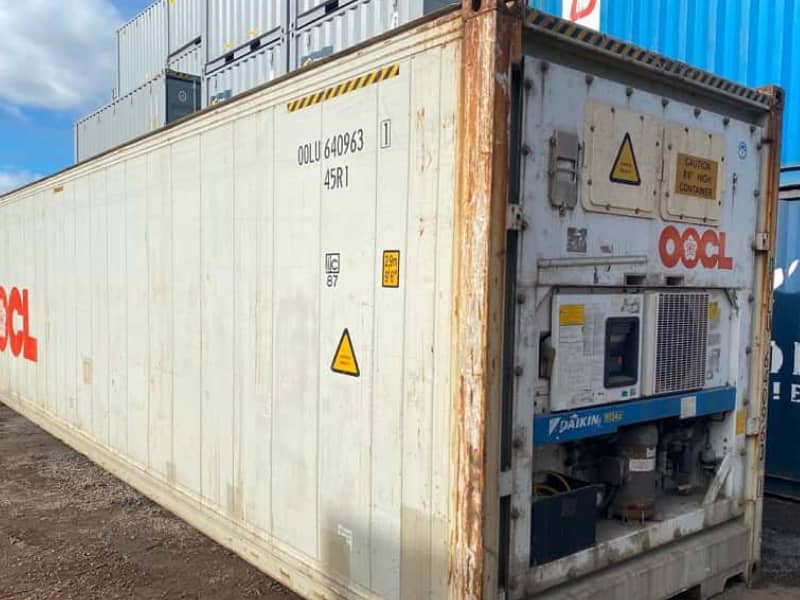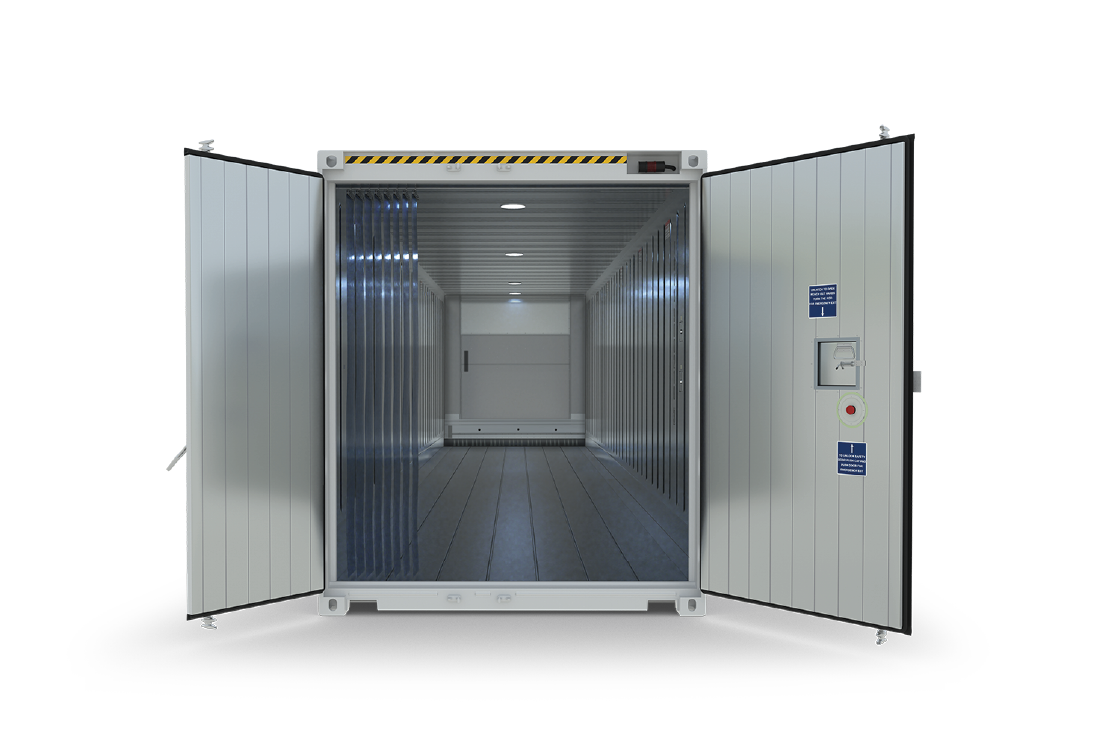Get trusted used 40ft refrigerated shipping containers for logistics
All Concerning Freezer Containers: Important Insights for Your Storage Space Requirements
Freezer containers play a crucial role in the conservation of perishable items. They come in numerous forms, consisting of refrigerated and shielded units, each made for particular storage space requirements. Recognizing the benefits and crucial features of these containers is necessary for businesses intending to maximize their operations. As the need for reliable storage options grows, checking out the various options offered can cause informed decisions that influence both profitability and sustainability. What aspects should one take into consideration when choosing the ideal container?
Kinds Of Cold Storage Containers
Cold storage space containers come in numerous kinds, each created to fulfill particular temperature level control needs. Among the most usual types are chilled containers, which preserve temperature levels in between 0 ° C to 10 ° C, making them appropriate for subject to spoiling items like fruits, veggies, and milk products. One more type is the deep freezer container, which operates at temperature levels listed below -18 ° C, perfect for long-lasting storage of frozen items such as meats and seafood.
Insulated containers give temperature level stability without active cooling, making them useful for temporary transportation of temperature-sensitive items. Furthermore, there are portable cold storage space devices, which use versatility in places and are commonly used in events or seasonal procedures. Ultimately, blast refrigerators rapidly reduce the temperature level of warm foods, making sure security and quality. Each type offers a special function in numerous markets, from food service to drugs, emphasizing the relevance of picking the best container for specific storage space requirements.

Benefits of Using Cold Storage Solutions

Chilly storage options extend the rack life of items, minimizing waste and increasing productivity for companies. By successfully managing supply with proper temperature level control, companies can enhance their supply chains and improve operational effectiveness.
In addition, cold storage space facilities permit adaptable storage choices, suiting various quantity demands and seasonal fluctuations popular (used 40ft refrigerated shipping containers). This flexibility helps services react promptly to market adjustments
Using cool storage options can assure conformity with health and security laws, safeguarding both consumers and services. On the whole, the critical use cold storage enhances product management while promoting sustainability and economic feasibility.
Secret Functions to Try To Find in Cold Store Containers
When picking freezer containers, numerous crucial functions quality mindful factor to consider to protect peak efficiency and dependability. First, temperature control capabilities are essential; containers should maintain regular temperature levels appropriate for particular goods. Insulation high quality also plays a significant duty, as remarkable insulation decreases energy intake and improves temperature security.
Next, ease of accessibility and loading is important; containers should use user-friendly layouts for effective handling and organization. Longevity is an additional essential facet; weather-resistant products guarantee long life and protect materials against ecological aspects.
Additionally, flexibility features, such as built-in wheels or raising points, promote transport, while customizable formats permit customized storage remedies.
Checking systems, including temperature alarm systems and remote tracking, offer real-time updates, making particular that conditions stay excellent. By focusing on these functions, customers can select cold store containers that meet their operational needs properly.
Selecting the Right Cold Storage Container for Your Needs
Selecting the appropriate cold store container needs a thoughtful analysis of specific needs and operational demands. Elements such as the kind of items being saved, temperature level level of sensitivity, and volume should be prioritized. As an example, disposable food products might require containers with rigid temperature controls, while drugs might call for specific problems to keep efficiency.
In addition, potential customers must take into consideration the container's dimension and wheelchair. A bigger system might be essential for mass storage space, while smaller, portable choices can be ideal for short-lived or on-site demands. Insulation quality and energy performance are likewise crucial, as these will impact functional expenses and temperature level stability.
Last but not least, compliance with market regulations and requirements is vital, particularly in industries like food and medical care. By very carefully reviewing these aspects, customers can choose a freezer container that successfully satisfies their one-of-a-kind demands and assurances ideal storage space conditions.
Finest Practices for Keeping Freezer Conditions
Keeping ideal cold store conditions is essential for protecting the high quality and security of temperature-sensitive products. Frequently keeping an eye on temperature and moisture levels is essential; making use of reliable electronic thermometers and hygrometers can supply accurate analyses. Additionally, correct insulation of freezer containers helps minimize temperature level changes and power loss.
Implementing a first-in, first-out (FIFO) system guarantees that older supply is utilized prior to newer stock, reducing waste (used 40ft refrigerated shipping containers). Furthermore, maintaining an arranged layout within the storage room enables far better air movement and lessens the danger of cross-contamination
Regular maintenance examine equipment, such as seals and compressors, are essential to stop breakdowns. Team training on ideal techniques for packing and unloading products assists preserve temperature level integrity. Ultimately, keeping doors shut as long as possible limits heat exchange, great site ensuring that the cold store environment remains efficient and stable in preserving important products.
Expense Considerations for Cold Storage Space Solutions
When assessing chilly storage space remedies, it is necessary to consider the preliminary financial investment costs together with continuous operational expenditures. A complete failure of these prices can expose considerable lasting savings possibility for organizations. Comprehending these economic elements aids stakeholders make educated decisions regarding their freezer requirements.

First Financial Investment Costs
The economic landscape of freezer containers provides different initial investment costs that services must think about. These costs usually consist of the purchase or rental cost of the containers, which can vary based upon size, kind, and insulation quality. Furthermore, costs connected to retrofitting existing frameworks to suit cold store must be factored in, especially if specialized equipment is required. Installation prices, consisting of electrical work and refrigeration systems, likewise add to the total first financial investment. Businesses should not overlook transportation prices for providing containers to their wanted location. Ultimately, possible customization alternatives, such as shelving or temperature surveillance systems, can additionally impact the preliminary financial investment. Mindful budgeting for these factors is important for effective cold store application.
Functional Expenses Failure
Functional costs for cold store options include several essential expense considerations that companies have to navigate. Key aspects include power costs, which can be substantial as a result of the requirement to keep reduced temperatures. Maintenance expenditures are additionally substantial, as routine servicing is important to assure devices runs efficiently and stays compliant with health and wellness criteria. Additionally, labor expenses may develop from the requirement for specialized personnel to take care of and check the storage space atmosphere. Insurance coverage expenditures are one more factor to consider, as business have to shield their investments against possible losses. Any type of potential regulative conformity expenses have to be factored in, go to this site as businesses may need to invest in systems that stick to food safety and security and environmental policies. Understanding these costs is crucial for reliable budgeting.
Long-Term Financial Savings Potential
Investing in cold store options uses substantial long-term cost savings potential, transforming preliminary expenses into monetary efficiency gradually. By reducing putridity and waste, businesses can enhance their earnings margins substantially. Advanced insulation and energy-efficient systems decrease energy costs, which gather over the lifespan of the devices. Chilly storage space containers often require much less frequent upkeep compared to typical refrigeration techniques, leading to reduced repair work expenditures. The ability to store items for extended durations without endangering high quality permits businesses to profit from market fluctuations, enhancing profits. Additionally, the scalability of cold storage space services allows firms to adapt to altering needs without sustaining excessive costs. Generally, these variables add to a compelling situation for cool storage space as an affordable financial investment approach.
Frequently Asked Questions
Exactly How Long Can Food Be Kept in Cold Store Containers?
The period food can be stored in cold storage containers varies by type. Normally, subject to spoiling things last from days to weeks, while icy foods can remain safe for months, depending on proper temperature and storage conditions.
Are Cold Store Containers Energy-Efficient?
The energy efficiency of cold storage containers varies based on design and insulation quality. Modern units frequently utilize advanced technology to reduce energy consumption, ultimately adding to lowered functional expenses and environmental effect in long-term use.
Can Cold Storage Space Containers Be Custom-made for Details Demands?
Cold store containers can undoubtedly be personalized to meet specific demands. Alterations may include temperature level controls, dimension adjustments, and added attributes, enabling users to tailor remedies properly for various storage space demands and operational preferences.
What Are the Usual Dimensions of Cold Storage Space Containers?
Cold store containers normally are available in conventional sizes such as 10, 20, and 40 feet. These measurements fit numerous storage space demands, guaranteeing flexibility for organizations needing temperature-controlled settings for subject to spoiling products or delicate materials.
Do Cold Store Containers Require Special Authorizations for Usage?
Cold storage containers frequently require special authorizations for use, relying on regional policies and intended applications. Authorities may mandate authorizations to ensure safety and security requirements, environmental conformity, and proper functional practices are preserved throughout their utilization.
Cold storage space containers come in various kinds, each designed to satisfy details temperature level control needs. In addition, cold storage centers permit for adaptable storage choices, suiting various volume demands and seasonal changes in need. Choosing the ideal cool storage container requires a thoughtful analysis of operational demands and details requirements. The monetary landscape of cool storage space containers presents various first investment expenses that services linked here have to consider. Cold storage containers can undoubtedly be customized to meet particular requirements.